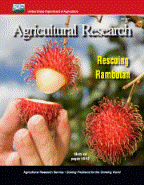United States Department of Agriculture: Agricultural Research Service, Lincoln, Nebraska

Agricultural Research Magazine
Date of this Version
3-2013
Document Type
Article
Citation
Agricultural Research March 2013
Abstract
President Barack Obama wants U.S. scientists to pursue an “all-of-the-above” strategy in developing new sources of domestic energy. Agricultural Research Service agronomist Paul Adler is providing complete cost-benefit breakdowns for using switch-grass pellets instead of fuel oil to heat homes and businesses in the Northeast.
“There have been a lot of studies on bioenergy potential,” says Adler, who works at the ARS Pasture Systems and Watershed Management Research Unit in University Park, Pennsylvania. “Most of them are focusing on transportation, but we still need a viable, commercial, bio-based fuel substitute for petroleum. In the meantime, our studies suggest that we already have opportunities to use homegrown feed-stocks for producing heat, and that we can save money, reduce petroleum use, and cut greenhouse gas production in the process.”
Adler and others conducted a life-cycle assessment comparing costs of energy generation from coal, natural gas, fuel oil, and switch-grass in the form of energy-dense cubes, briquettes, and pellets. His research partners included ARS technician Fred McNeal, Pennsylvania State University graduate student Tom Wilson, Wilson’s advisor David Abler, and Drexel University assistant professor Sabrina Spatari.
The researchers calculated the economic outlays associated with switch-grass production throughout the supply chain and the amounts of greenhouse gases—carbon dioxide, nitrous oxide, and methane— emitted during switch-grass production, densification, and conversion to heat and power. This included the first life-cycle inventory of switch-grass seed production and the greenhouse gas emissions associated with it, which the team developed using real-world information from a Pennsylvania producer.
Included in
Agriculture Commons, Animal Sciences Commons, Food Science Commons, Plant Sciences Commons

